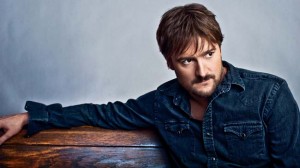Interview: Eric Church

Even if he was preemptively playing along with what he assumes to be a skeptical urban magazine, Eric Church raises some salient points about country music. His career, after all, could be one of its songs.
He isn’t one of those momma-got-run-over-by-a-train-when-I-was-drunk things David Allan Coe and Steve Goodman once sent up, neither is he one of the polished pop/rock turds that passes for country on CMT and in Nashville’s boardrooms, nor a Kenny ‘n’ Keith-style interloper. He grew up in North Carolina, on country and rock ‘n’ roll, and did he and his bandmates ever pay their dues.
Appearing: May 15th at Sears Centre in Hoffman Estates with Brantley Gilbert and Blackberry Smoke.
“I just read in Nashville, there’s a label that’s trying to sign a bunch of guys like us who want to do what we do,” he grumbles. “And it makes me laugh! ‘You guys got to be kidding!’ Nobody would be stupid enough to follow our path. You look back at where we came from, nobody would survive it. I can’t believe we did.”
He can laugh now, what with Chief (EMI Nashville) the first country album since the ’60s to top the mainstream Billboard charts without a number-one single. But Church is somewhat annoyed that his spit and blood are being fatally ignored in someone’s marketing proposal.
“I wish people would let more artists develop,” he says. “I think we’ve lost — and this goes for all music — artist development. You throw it out there, it either works or it doesn’t. If it doesn’t, we got to find something else. Then it becomes, ‘Well, we know this works over here: let’s copy that.'”
Not that Church isn’t above a little petty larceny himself. Country can just be so limiting.
“Country music to me has always been the best songs, the best songwriters,” he believes. “That’s why it appeals to me and most people in America. But the energy you get from rock ‘n’ roll and rock ‘n’ roll shows is unparalleled. It’s unmatched. I don’t think anybody in country, frankly, does it like a lot of the guys in rock do it. I don’t know why. Maybe they’re willing to go there. I think in country sometimes we get caught up in what demographic we’re appealing to, like we might offend somebody or there’s too many old people in the crowd.”
He hoots, “Rock comes in with guns slinging!”
And so, when Church and his band swing through Hoffman Estates, you might notice a shift from the typical C&W dynamic. Goodbye Stetson . . . hello Eddie?
“We went and adopted — well, we stole — an idea from Iron Maiden,” he admits, “where they used backdrops and the motion of backdrops, where they get snatched up or move side-to-side: it’s like a pulley system. And it was just so interesting, like it was video before there was video. But it’s movement and staging, and different backdrops correspond with different songs. And we’re not afraid to blow shit up. It’s like a rock ‘n’ roll show out there, and people are scared of that in country but not us: it’s what we do. It’s very in-your-face, and you never know if something’ll catch on fire.”
And yanging his yin for mayhem, Church has very specific ideas about what does not work for him.
“One of my pet peeves is video screens: I hate ’em,” he laughs. “I think a lot of artists rely on them; I think a lot of artists hide behind them. I’ve been to so many shows when a person had a first or third row seat, the artist’s right in front of them, and they’re watching that screen almost like they’re watching television. I remember when I was a kid, even if you had a bad seat there’s things to get caught up in, whether it’s the movement on the stage, what the band members are doing, the lights, even the people in your section. There’s much more to a concert than just getting that close-up view all the time.”
He’s aware that with bigger venues come not only less knowledgeable fans, but people who come out less, period. His dedication will remain to those who got him here.
— Steve Forstneger
For the full story, visit the issue through our partners at ShadeTree, or grab a copy available free throughout Chicagoland.











